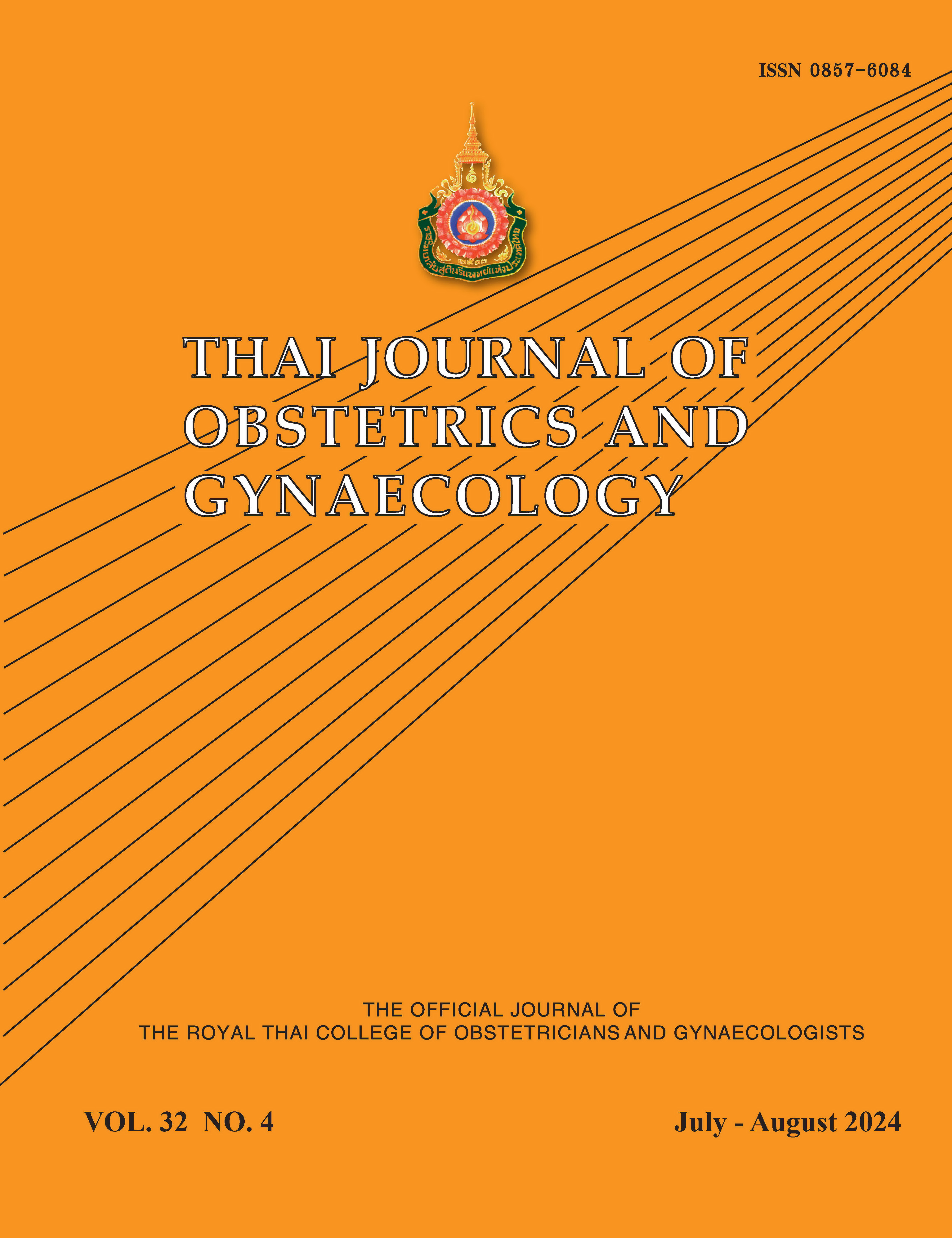Comparing the Different Antenatal Nutritional Counseling Methods Regarding Proper Gestational Weight Gain during the Second Trimester: A randomized, controlled trial
Main Article Content
Abstract
Objectives: To compare the two different antenatal nutritional counseling styles [computer-assisted instruction (CAI) and routine, casual, individual (RCI)] regarding the proper gestational weight gain (GWG) of healthy pregnant women during the second trimester, and to identify the factors influencing the level of pregnant women’s GWG.
Materials and Methods: This was a randomized, controlled study comparing the number of pregnant women in the CAI and RCI groups who had a proper GWG during the four-week period.
Results: There were 70 and 80 participants in the CAI and RCI groups, respectively. The basic characteristics of the two groups at the beginning of the study were similar. The rate of the participants who had an appropriate GWG according to their pre-pregnancy BMI in both groups was comparable (p = 0.656, 0.307, 0.111, and 0.524 among the underweight, normal-weight, overweight and obese women, respectively). The number of participants who had an appropriate GWG was 50.0%, 47.8%, 23.1%, and 20.0% in the CAI group and 37.5%, 58.3%, 58.3%, and 50.0% in the RCI group. The GWG per week according to the participants’ pre-pregnancy BMI was comparable in both groups (p = 0.585, 0.292, 0.087, and 0.614 in the underweight, normal-weight, overweight, and obese women, respectively). The multiparous women had a significantly increased possibility of having an appropriate GWG (p = 0.013).
Conclusion: Antenatal nutritional counseling using CAI was shown to be comparable to RCI in trying to achieve an appropriate GWG. The multiparous individuals had significant factors for having an appropriate GWG.
Article Details

This work is licensed under a Creative Commons Attribution-NonCommercial-NoDerivatives 4.0 International License.
References
Rooney CIE, the WHO Maternal Health and Safe Motherhood Program. Antematal care and maternal health: How effective is it? A review of the evidence” [update 1992; cite 2022 May 12]. Available from: http://apps.who.int>iris>bitstream.
Ekabua J, Ekabua K, Njoku C. Proposed framework for making focused antenatal care service accessible: A review of the Nigerian setting. ISRN Obstet Gynecol 2011;2011:253964.
Plecas D, Plesinac S, Vucinic O. Nutrition in pregnancy: Basic principles and recommendations. Srp Arh Celok Lek 2014;142:125-30.
Holton S, East C, Fisher J. Weight management during pregnancy: A qualitative study of women’s and care providers’ experiences and perspectives. BMC Pregnancy Childbirth 2017;17:351.
Kiani Asiabar A, Amin Shokravi F, Hajifaraji M, Zayeri F. The effects of an educational intervention in early pregnancy with spouses’ participation in optimal gestational weight gain in pregnancy: A randomized controlled trial. Health Educ Res 2018;33:535-47.
Institute of Medicine (US) and National Research Council (US) Committee to Reexamine IOM Pregnancy Weight Guidelines. Weight gain during pregnancy: Reexamining the guidelines. Rasmussen KM, Yaktine AL, editors. Washington (DC): National Academies Press (US); 2009.
Chao AM, Srinivas SK, Studt SK, Diewald LK, Sarwer DB, Allison KC. A pilot randomized, controlled trial of a technology-based approach for preventing excess weight gain during pregnancy among women with overweight. Front Nutr 2017;5:57.
Olson CM, Groth SW, Graham ML, Reschke JE, Strawderman MS, Femandez ID. The effectiveness of an online intervention in preventing excessive gestational weight gain: the e-moms roc randomized controlled trial. BMC Pregnancy Childbirth 2018;18:148.
Arthur C, Di Corleto E, Ballard E, Kothari A. A randomized, controlled trial of daily weighing in pregnancy to control gestational weight gain. BMC Pregnancy Childbirth 2020;20:223.
Hajian S, Aslani A, Sarbakhsh P, Fathnezhad-Kazemi A. The effectiveness of healthy lifestyle interventions on weight gain in overweight pregnant women: A cluster-randomized, controlled trial. Nursing Open 2020;7:1876-86.
Mourtakos SP, Tambalis KD, Panagiotakos DB, Antonogeorgos G, Arnaoutis G, Karteroliotis K, et al. Maternal lifestyle characteristics during pregnancy and the risk of obesity in the offspring: A study of 5125 children. BMC Pregnancy Childbirth 2015;66:1-8.
Hanprasertpong T, Rattanaprueksachart R, Janwadee S, Geater A, Kor-anantakul O, Suwanrath C, et al. Comparison of the effectiveness of different counseling methods before second-trimester genetic amniocentesis in Thailand. Prenat Diagn 2013;33:1189-93.
Sroiwatana S, Puapornpong P. Outcomes of video-assisted teaching for latching in postpartum women: A randomized, controlled trial. Breastfeed Med 2018;13: 366-70.
Pawalia A, Kulandaivelan S, Savant S, Yadav VS. Effect of behavioral interventions for obesity prevention in pregnancy on the adequacy of gestational weight gain and retention: The metabolic health of Indian women. Ser J Exp Clin Res 2020;21:35-42.
Olander EK, Hill B, Skouteris H. Healthcare professionals’ training regarding gestational weight gain: Recommendations and future directions. Curr Obes Rep 2021;10:116-24.
Claesson IM, Sydsjo G, Brynhildsen J, Cedergren M, Jeppsson A, Nystrom F, et al. Weight-gain restriction for obese pregnant women: A case-control intervention study. BJOG 2008;115:44-50.


